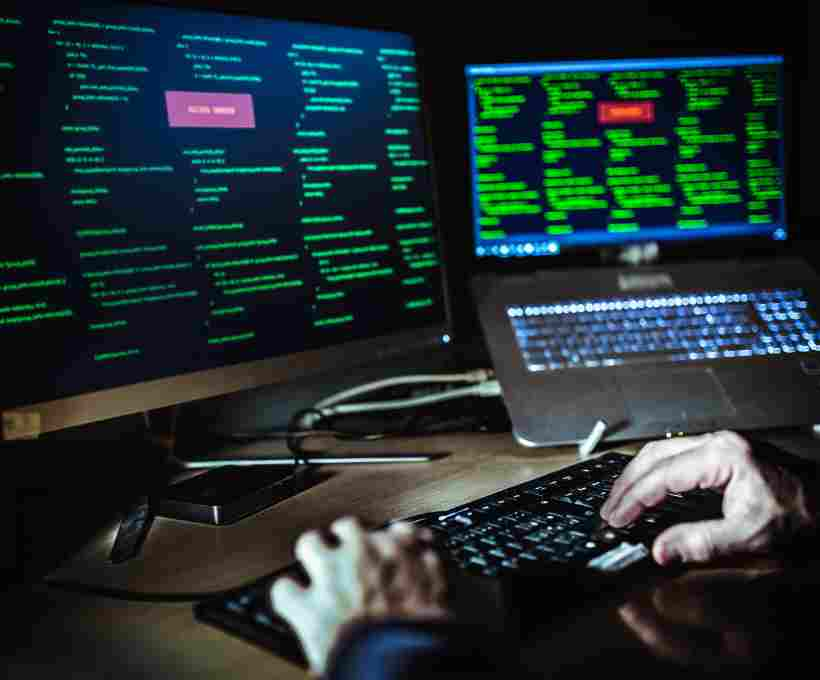If you think of hacking, the first image that might pop into your head is a hoodie-wearing person in a dark room, typing furiously while lines of code run across the screen.
In reality, the world of ethical hacking is a lot less like a movie and far more professional. Ethical hackers — often called white-hat hackers — work with permission, follow strict laws, and help organizations strengthen their cybersecurity defenses.
But here’s the big question: What exactly qualifies someone to be an ethical hacker?
It’s not just about knowing how to “break into” a system. It’s a mix of education, skills, certifications, experience, and, most importantly, ethics.
Let’s break it all down step-by-step.
1. First, What Does an Ethical Hacker Do?
Before talking qualifications, we need to understand the role. Ethical hackers are professionals hired by companies, government agencies, or individuals to find security vulnerabilities in their systems before malicious hackers exploit them.
Think of them as digital security testers. They perform penetration testing, network scanning, social engineering tests, and other security checks — always with permission and always following legal guidelines.
Their job is to:
- Identify security weaknesses in networks, applications, and systems.
- Suggest fixes to prevent cyberattacks.
- Stay ahead of new hacking techniques and malware threats.
It’s a role that blends technical expertise with ethical responsibility.
2. Educational Qualifications
Unlike some professions where there’s one official degree path, ethical hacking has multiple entry points. You can become one with a mix of formal education and practical skills.
A. Formal Degrees
While a degree isn’t mandatory for all jobs, many employers prefer candidates with qualifications in:
- Computer Science
- Information Technology
- Cybersecurity
- Networking
- Software Engineering
A Bachelor’s degree (B.Sc., B.Tech, B.E., or similar) in these fields provides a strong foundation in programming, system architecture, and security principles.
B. Short-Term Courses
Some people skip traditional degrees and take specialized cybersecurity diplomas or bootcamps, which can last from a few months to a year. These focus specifically on practical hacking and security testing skills.
C. Self-Learning Path
There’s also the self-taught route. Many ethical hackers start with a passion for technology and learn from online tutorials, YouTube channels, cybersecurity blogs, and open-source platforms.
However, formal education still has its advantages — it gives you credibility when applying for jobs and helps you understand the “why” behind the tools you use.
3. Essential Skills Required
Qualifications aren’t just about degrees or certifications — skills matter just as much. Ethical hackers need to be digital problem-solvers with a curious and analytical mind.
Here are the core skill sets:
A. Technical Skills
- Networking Knowledge – Understanding TCP/IP, DNS, HTTP, VPN, firewalls, and routing is essential.
- Operating Systems Mastery – Linux (especially Kali Linux) is a hacker’s best friend. Windows and macOS knowledge is also vital.
- Programming Skills – Python, JavaScript, C/C++, PHP, and SQL are common languages used in ethical hacking tasks.
- Database Management – Understanding MySQL, MongoDB, or Oracle to test database security.
- Cryptography – Knowing encryption algorithms and how they can be broken or secured.
- Cloud Security – With more businesses moving to AWS, Azure, and Google Cloud, securing cloud environments is crucial.
B. Soft Skills
- Problem-Solving Mindset – Thinking creatively to find vulnerabilities.
- Attention to Detail – A single overlooked bug can lead to a major breach.
- Patience & Persistence – Penetration testing can take hours, days, or even weeks.
- Communication Skills – Being able to explain technical findings in simple language to non-technical stakeholders.
4. Professional Certifications
When people ask about the “qualification” of an ethical hacker, they often mean certifications. In cybersecurity, certifications are highly valued because they prove you have both the knowledge and practical skills.
Here are the top certifications employers recognize:
A. Certified Ethical Hacker (CEH)
- Offered by EC-Council.
- One of the most recognized certifications in the ethical hacking world.
- Covers penetration testing, system hacking, social engineering, and more.
- Requires passing an exam after training or proving prior experience.
B. Offensive Security Certified Professional (OSCP)
- Offered by Offensive Security.
- Highly practical and hands-on; considered more challenging than CEH.
- Focuses on real-world penetration testing scenarios.
C. CompTIA Security+
- Beginner-friendly certification covering general cybersecurity concepts.
- Great for entry-level ethical hackers.
D. CompTIA PenTest+
- Specializes in penetration testing and vulnerability assessment.
E. GIAC Penetration Tester (GPEN)
- Offered by SANS Institute.
- Well-regarded, with deep training in advanced hacking techniques.
F. Certified Information Systems Security Professional (CISSP)
- More advanced; focused on broader information security management.
G. Cloud Security Certifications
- AWS Certified Security – Specialty
- Microsoft Certified: Azure Security Engineer Associate
These certifications not only boost credibility but can also help ethical hackers negotiate higher salaries.
5. Legal and Ethical Qualifications
This is where many forget an important detail: Ethics are part of your qualification.
A person with brilliant hacking skills but no ethical responsibility is just… a hacker, not an ethical hacker.
Ethical hackers must:
- Work only with written permission from the system owner.
- Follow the scope of testing agreed upon.
- Never misuse or leak any discovered data.
- Report all findings honestly.
Some countries even require ethical hackers to undergo background checks to ensure trustworthiness before working in sensitive environments.
6. Experience Matters
Employers often want to see hands-on experience. If you’re starting, you can build this by:
- Participating in bug bounty programs (like HackerOne, Bugcrowd).
- Joining Capture The Flag (CTF) competitions.
- Volunteering to test security for small businesses or NGOs.
- Creating your own lab at home to practice penetration testing.
Real-world problem-solving will always look better than just a paper qualification.
7. Continuous Learning
Technology changes quickly. A technique that works today may be obsolete in a year.
That’s why an ethical hacker’s most important qualification is the ability to keep learning.
- Follow cybersecurity news and blogs.
- Take refresher courses regularly.
- Learn about new attack vectors like IoT hacking or AI-driven cyberattacks.
- Upgrade certifications as new versions release.
8. Pathway to Becoming an Ethical Hacker
If we put all qualifications together, a typical journey might look like this:
- Start with a tech background – degree, diploma, or self-learning.
- Learn core IT skills – networking, programming, OS, databases.
- Get into cybersecurity basics – understand firewalls, encryption, malware.
- Practice – home labs, CTFs, bug bounties.
- Earn certifications – CEH, OSCP, etc.
- Build experience – internships, freelance work, security audits.
- Stay ethical and updated – always follow laws and keep learning.
9. Salary Impact of Qualifications
Qualifications directly influence salary potential. For example:
- Entry-level ethical hackers with a Security+ or CEH might earn $40,000–$60,000 annually.
- Mid-level professionals with 3–5 years of experience and advanced certifications (OSCP, GPEN) can earn $70,000–$100,000.
- Senior ethical hackers or penetration testers in specialized fields (cloud, IoT) can cross $120,000–$150,000.
Freelancers working in bug bounty programs have even made six figures without a formal job.
10. Myths About Ethical Hacking Qualifications
Let’s clear up a few misconceptions:
- Myth 1: “You must have a computer science degree.” → Not true. Many ethical hackers are self-taught but certified.
- Myth 2: “Only young people can become ethical hackers.” → Cybersecurity has no age limit; what matters is skill.
- Myth 3: “You need to be a coding genius.” → Coding helps, but you can specialize in areas with minimal programming.
- Myth 4: “Ethical hacking is illegal.” → Not if done with permission.
11. Challenges in Meeting Ethical Hacker Qualifications
It’s worth noting that becoming an ethical hacker isn’t always a smooth road. Some challenges include:
- Cost of certifications – CEH or OSCP exams can be expensive.
- Keeping up with technology – Requires constant learning.
- Finding first job – Employers often want experience, but you need a job to get it.
- Legal awareness – Accidentally going beyond the agreed scope can have legal consequences.
12. The Human Side of Ethical Hacking
Beyond technical skills and certificates, companies look for people with:
- Integrity – You’ll often have access to sensitive information.
- Curiosity – The best hackers keep asking, “What if I try this?”
- Discipline – Following a process instead of jumping to conclusions.
- Teamwork – Security is rarely a solo mission.
These qualities make the difference between a good ethical hacker and a great one.
Final Thoughts
So, what is the qualification of an ethical hacker?
It’s not just a degree, or just a certification, or just skill. It’s the combination of:
- Education (formal or self-taught)
- Technical skills (networking, programming, OS, databases)
- Certifications (CEH, OSCP, etc.)
- Experience (labs, bug bounties, real-world testing)
- Ethics (legality, integrity, responsibility)
- Continuous learning (staying updated with new threats)
Ethical hacking is one of the rare careers where your qualification is never truly “finished.” You’ll always be learning, upgrading, and adapting.
If you have the curiosity to explore, the patience to test, and the integrity to do it the right way, you already have the foundation to qualify. The rest is about building skills, earning certifications, and proving your abilities.





